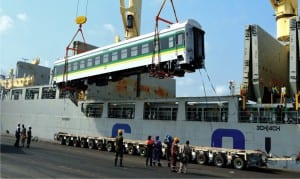Maritime
FG To Probe Illegal Collection Of Fees At Ports

One of the 88 seater standard coaches for Abuja-Kaduna mass transit train services being offloaded from the ship at Apapa Port in Lagos, yesterday.
The controversy sur
rounding the alleged illegal collection of Practitioners Operating Fees (POF) at the Onne Port in Rivers State and other ports in the country would soon be a thing of the past.
This is because the Minister for Transportation, Rt. Hon. Chubuike Rotimi Amaechi and the National Security Adviser, have now indicated interest on the matter and are set to look into the allegation critically.
The Tide gathered that already some leading clearing and forwarding associations were summoned for a meeting last month and the matter is receiving serious attention.
It was learnt that the major clearing and forwarding associations that have been collecting these fees were petitioned by a faction kicking against the alleged illegal collections which had run into billions of naira.
Our correspondent further gathered that the founder of the Council for the Regulation of Freight Forwarding in Nigeria (CRFFN), Dr Boniface Aniabonam, recently expressed fresh fears as the council faces challenges with the collection of the Practitioners Operating Fees, as the payment process is yet to be linked with the single windows platform or account of the Nigeria Customs Service (NCS) and other government revenue collecting agencies.
Aniebonam also picked holes in the method of collection, stressing that there were too many loopholes for freight forwarders to exploit, but stressed the need for members to pay the POF since part of the money would be utilized by the association to develop capacity of their members.
Similarly, it was also revealed that the President of National Association of Government Approved Freight Forwarders (NAGAFF), Chief Eugene Nweke warned members to pay the POF as they owe a duty to pay if they did not pay they should be ready to face Jail terms.
According to him, the National Assembly and the Ministry of Justice have been notified of the collection, which he said was an indication that freight forwarders have come of age.
Despite all these developments, there is a fresh move to ensure that these fees are no longer collected because no one had accounted for the ones so far collected.
It would be recalled that the Executive Secretary of the Nigerian Shippers’ Council (NSC), Hassan Bello recently directed the Association of Nigerian Licensed Customs Agents (ANLCA) to stop all forms of fee collection at Onne seaport.
The Tide correspondent gathered that Bello, who was represented by Chief Cajatan Agu handed down the warning during a town hall meeting organized by the South-South Zone of the council in Port Harcourt Rivers State, frowned at the continued report of ANLCA collecting professional fees at Onne Port, as the activities are impeding smooth clearance of goods at the port.
He stated that as the ports’ economic regulators, they would only promote programmes aimed at facilitating trade and fast-track clearing.
Stroies from Collins Barasemeye
Maritime
NSC Decries Police Interferences With Cargoes At Seaports

Maritime
NIMASA :FG Appoints Iyelolu As Registrar Of Ships

Maritime
Cargo Tracking System’ II Save Nigeria N900bn In Revenue Leakages ……SEREC

-

 Sports4 days ago
Sports4 days agoBarca Impress On Return To Camp Nou
-

 Sports4 days ago
Sports4 days agoBundesliga: Oliseh Stars As Bayern Rebound To Thrash Freiburg
-

 Sports4 days ago
Sports4 days agoSunderland Fall At Fulham
-

 Sports4 days ago
Sports4 days agoForest Embarrass Liverpool At Anfield
-

 Sports4 days ago
Sports4 days agoOgoni Nation Cup: Victory Against Amee Base Excites Coach
-

 Niger Delta4 days ago
Niger Delta4 days agoTraditional Ruler Seeks End To Benin Artifacts Unauthorized Promotion
-

 Maritime4 days ago
Maritime4 days agoNSC Decries Police Interferences With Cargoes At Seaports
-

 Politics4 days ago
Politics4 days agoCleric Tasks APC On Internal Stability, Warns Otti

